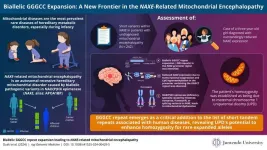(Press-News.org) University of Queensland researchers have developed a new class of oral painkillers to suppress chronic abdominal pain that is based on the peptide hormone oxytocin that drives childbirth contractions.
Associate Professor Markus Muttenthaler from UQ’s Institute for Molecular Bioscience led a team that has changed the chemical structure of oxytocin to make it gut-stable after earlier work revealed the hormone could treat abdominal pain.
Dr Muttenthaler said there was an urgent need for new treatments for the chronic pain caused by gastrointestinal disorders such as irritable bowel syndrome (IBS) and irritable bowel disease (IBD).
“This pain affects up to 15 per cent of adults in their lifetime, and all we have are anti-inflammatories and opioids which can cause side effects and addiction,” Dr Muttenthaler said.
“Our research focuses on peptides that are highly potent and selective molecules and have few side effects. However, nearly all peptide drugs must be injected as they are rapidly digested in the gut.
“We have now developed a way of making peptides gut-stable so they can be given orally.
“This is a new and highly promising approach to treating gut disorders.”
Oxytocin is a peptide hormone produced in the brain which is known as the ‘bonding hormone’ or the ‘love molecule’ due to its effects on relationship building, empathy and trust.
Oxytocin is also the key hormone that induces uterine contractions during labour and facilitates milk release during breastfeeding.
“We identified the parts of oxytocin that are rapidly broken down by gut enzymes and used medicinal chemistry to render them gut-stable while ensuring that the new molecule was still able to activate the oxytocin receptor,” Dr Muttenthaler said.
“We now have a new class of molecules that are potently active but do not degrade in the stomach or intestine, meaning they can be taken orally.”
The research indicates that the new molecules work in the colon and do not need to cross the gut barrier into the bloodstream to suppress abdominal pain.
“This is a very safe therapeutic approach as it reduces the risk of side effects in the rest of the body, a problem with many other systemic drugs,” Dr Muttenthaler said.
“This is an exciting new mode of action to prevent pain.
“We are currently looking for investors to accelerate pre-clinical studies, with the goal of taking it into the clinic.
“Now that we have perfected making peptides stable, we are looking at other gut drugs to improve treatment options for gastrointestinal disorders, an unmet medical need.”
END
New oral drug to calm abdominal pain
Researchers have developed a new class of oral painkillers to suppress chronic abdominal pain that is based on the peptide hormone oxytocin that drives childbirth contractions
2024-11-18
ELSE PRESS RELEASES FROM THIS DATE:
New framework champions equity in AI for health care
2024-11-18
(Toronto, November 18, 2024) A recent study published in the Journal of Medical Internet Research introduced the EDAI framework, a comprehensive guideline designed to embed equity, diversity, and inclusion (EDI) principles throughout the artificial intelligence (AI) lifecycle. Led by Dr Samira Abbasgholizadeh-Rahimi, PhD, the Canada Research Chair (Tier II) in AI and Advanced Digital Primary Health Care, the research addresses a significant gap in current AI development and implementation practices in health and oral health care, which often overlook critical EDI factors. With EDAI, AI ...
We finally know where black holes get their magnetic fields: Their parents
2024-11-18
Black holes are one of the most enigmatic stellar objects. While best known for swallowing up their surroundings into a gravity pit from which nothing can escape, they can also shoot off powerful jets of charged particles, leading to explosive bursts of gamma rays that can release more energy in mere seconds than our sun will emit in its entire lifetime. For such a spectacular event to occur, a black hole needs to carry a powerful magnetic field. Where this magnetism comes from, however, has been a long-standing ...
Multiple sclerosis drug may help with poor working memory
2024-11-18
Fampridine is currently used to improve walking ability in multiple sclerosis. A new study shows that it could also help individuals with reduced working memory, as seen in mental health conditions like schizophrenia or depression.
Remembering a code for long enough to type it in; holding a conversation and reacting appropriately to what is being said: in everyday situations like these, we use our working memory. It allows a memory to be actively retained for a few seconds. Certain conditions, such as schizophrenia ...
The MIT Press releases workshop report on the future of open access publishing and policy
2024-11-18
Cambridge, MA (November 18, 2024) – Today the MIT Press is releasing a workshop report on what additional information is needed to ensure that open access publication benefits research, entitled "Access to Science & Scholarship 2024: Building an Evidence Base to Support the Future of Open Research Policy." The report is the outcome of a workshop funded by the National Science Foundation and held at the D.C. headquarters of the American Association for the Advancement of Science on September 20, 2024.
The implementation of open access has resulted in consolidation of the publishing industry, an explosion in unreviewed articles, and new costs that may be hard ...
Why substitute sugar with maple syrup?
2024-11-18
Quebec, CA, November 18, 2024 – A new study published in the The Journal of Nutrition, found that substituting two tablespoons of pure maple syrup for refined sugars reduced several cardiometabolic risk factors in humans. It was the first placebo-controlled clinical trial exploring potential health benefits of maple syrup in humans.
“We know from decades of research that maple syrup is more than just sugar. It contains over 100 natural compounds, including polyphenols, that are known to prevent disease in part through their anti-inflammatory ...
New study investigates insecticide contamination in Minnesota’s water
2024-11-18
MINNEAPOLIS / ST. PAUL (11/18/2024) — A new study by researchers at the University of Minnesota Twin Cities in collaboration with the Minnesota Department of Natural Resources (DNR) found that specific insecticides, called neonicotinoids, were found at high concentrations in some ground and surface water sources that could affect drinking water.
Individuals relying on shallow groundwater or natural springs for drinking water have a higher risk of contamination from these insecticides compared to those getting their drinking water from deep groundwater wells. ...
The Einstein Foundation Berlin awards €500,000 prize to advance research quality
2024-11-18
The €500,000 Einstein Foundation Award for Promoting Quality in Research honors researchers and institutions whose work helps to fundamentally advance the quality and robustness of research findings. The award is bestowed jointly with the QUEST Center for Responsible Research, Berlin Institute of Health (BIH) at Charité. „The Einstein Foundation Award seeks to amplify the importance of quality and accountability in research, particularly as science plays a critical role in addressing global challenges,“ explains Martin Rennert, Chair of the Einstein Foundation’s Executive Board. ...
Mitochondrial encephalopathy caused by a new biallelic repeat expansion
2024-11-18
Mitochondrial diseases are among the most prevalent hereditary metabolic disorders, known to occur in one out every 5000 births. Single nucleotide variations, indels, and structural variations are known to cause these disorders. While many arise from single nucleotide variations, indels, or structural variants, some forms are also triggered by repeat expansions in nuclear genes affecting mitochondrial function, which can result in severe mitochondrial dysfunction. These diseases often impact the central nervous system (CNS), and mitochondrial encephalopathies represent a subset characterized by prominent ...
Nanoplastics can impair the effect of antibiotics
2024-11-18
Minuscule particles of plastic are not only bad for the environment. A study led from Umeå University, Sweden, has shown that the so-called nanoplastics which enter the body also can impair the effect of antibiotic treatment. The results also indicate that the nanoplastics may lead to the development of antibiotic resistance. Even the indoor air in our homes contains high levels of nanoplastics from, among other things, nylon, which is particularly problematic.
"The results are alarming considering how common nanoplastics are and because effective antibiotics for many can be the difference between life and death," says Lukas Kenner, ...
Be humble: Pitt studies reveal how to increase perceived trustworthiness of scientists
2024-11-18
How can scientists across climate science, medical and psychological topics foster the public’s trust in them and their science? Show that they are intellectually humble.
Those are some of the findings of two intellectually humble University of Pittsburgh scientists and their co-authors, using five separate studies totaling 2,034 participants in research published Nov. 18 in Nature Human Behaviour.
“Research has shown that having intellectual humility — which is an awareness that one’s knowledge or beliefs might be incomplete or wrong — is associated with engaging in more effortful and less biased information processing,” said Jonah Koetke, ...
LAST 30 PRESS RELEASES:
Striking genomic architecture discovered in embryonic reproductive cells before they start developing into sperm and eggs
Screening improves early detection of colorectal cancer
New data on spontaneous coronary artery dissection (SCAD) – a common cause of heart attacks in younger women
How root growth is stimulated by nitrate: Researchers decipher signalling chain
Scientists reveal our best- and worst-case scenarios for a warming Antarctica
Cleaner fish show intelligence typical of mammals
AABNet and partners launch landmark guide on the conservation of African livestock genetic resources and sustainable breeding strategies
Produce hydrogen and oxygen simultaneously from a single atom! Achieve carbon neutrality with an 'All-in-one' single-atom water electrolysis catalyst
Sleep loss linked to higher atrial fibrillation risk in working-age adults
Visible light-driven deracemization of α-aryl ketones synergistically catalyzed by thiophenols and chiral phosphoric acid
Most AI bots lack basic safety disclosures, study finds
How competitive gaming on discord fosters social connections
CU Anschutz School of Medicine receives best ranking in NIH funding in 20 years
Mayo Clinic opens patient information office in Cayman Islands
Phonon lasers unlock ultrabroadband acoustic frequency combs
Babies with an increased likelihood of autism may struggle to settle into deep, restorative sleep, according to a new study from the University of East Anglia.
National Reactor Innovation Center opens Molten Salt Thermophysical Examination Capability at INL
International Progressive MS Alliance awards €6.9 million to three studies researching therapies to address common symptoms of progressive MS
Can your soil’s color predict its health?
Biochar nanomaterials could transform medicine, energy, and climate solutions
Turning waste into power: scientists convert discarded phone batteries and industrial lignin into high-performance sodium battery materials
PhD student maps mysterious upper atmosphere of Uranus for the first time
Idaho National Laboratory to accelerate nuclear energy deployment with NVIDIA AI through the Genesis Mission
Blood test could help guide treatment decisions in germ cell tumors
New ‘scimitar-crested’ Spinosaurus species discovered in the central Sahara
“Cyborg” pancreatic organoids can monitor the maturation of islet cells
Technique to extract concepts from AI models can help steer and monitor model outputs
Study clarifies the cancer genome in domestic cats
Crested Spinosaurus fossil was aquatic, but lived 1,000 kilometers from the Tethys Sea
MULTI-evolve: Rapid evolution of complex multi-mutant proteins
[Press-News.org] New oral drug to calm abdominal painResearchers have developed a new class of oral painkillers to suppress chronic abdominal pain that is based on the peptide hormone oxytocin that drives childbirth contractions






